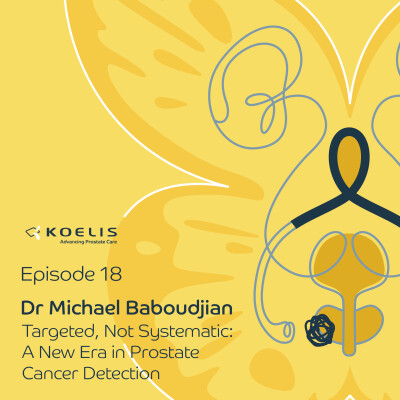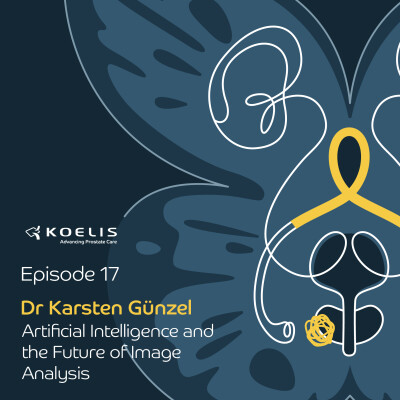- Speaker #0
This podcast is created by Coelis.
- Speaker #1
There is a debate about not systematic biopsies, because for me, systematic biopsies should be abandoned. But the aim is, should we do distant biopsies?
- Speaker #0
Dear Prostat pioneers, welcome to another probing episode of Prostat Talk, the only show where we dig deep into the gland that nobody wants to talk about. But everyone should. Now, today, we are not here to poke around, literally. In fact, we are talking about not poking at all. That's right, systematic prostate biopsies might just be one their way out. Instead, the future seems to lie in more targeted strategies, less switches and more laser precision. Because when it comes to prostates, more needles don't always mean more answers. To help us navigate this ship from tradition to innovations, We have invited a very special guest, Dr. Baboudjian, joining us from the sun-drenched Bouillabaisse rich city of Marseille. So, grab your espresso and get ready for a conversation that might just change how we approach prostate cancer. Hello, Dr. Baboudjian. I'm delighted to welcome you again on our Postcats Prostate Talk. This is the second time that you are in Prostate Talk. Last time, we had the pleasure... to talk with you about active surveillance in prostate cancer care. For our listeners, feel free to reach out this episode for more information about it. So, Dr. Baboudjian, how are you today?
- Speaker #1
Thank you. Thank you again for the invitation. I'm glad to be back here with you. Thank you.
- Speaker #0
Before talking about prostate cancer, could you please tell us more about yourself?
- Speaker #1
Well, I'm 33, urologist in Marseille, and my main activities are prostate cancer and BPH.
- Speaker #0
Great. Well, during my research, I came across your preference for transperineal prostate biopsies. Could you explain us why?
- Speaker #1
Well, I switched three years ago from transrectal to transperineal biopsies because of the less infectious risk and more detection of clinically significant prostate cancer.
- Speaker #0
And today, are you only performing transperineal biopsies or sometimes do you perform transrectal?
- Speaker #1
No, I have abandoned the transrectal approach and now all my biopsies are through a transperineal approach.
- Speaker #0
And what are the criteria of choice for making this kind of biopsy?
- Speaker #1
Well, I have switched first because of the infectious aggument. We don't have anymore any use of antibiotics, of any use of urinary culture, we don't have anymore any infection. So this is the main point. And then we have now more recent data about the detection of significant cancer. And probably there is a preference for the transparent approach.
- Speaker #0
It's not the safety and the easiest way to perform biopsies. Great. So doing my research, I've noticed you published the result of an European survey regarding prostate biopsies technique. Could you tell us a bit about that?
- Speaker #1
Yes. If we look at the European guidelines on prostate cancer, they switch from systematic to regional biopsies one year ago. And we wanted one year after to ask European urologists what they are doing in practices. First point is 90% of urologists still do systematic biopsies. And very few, 15 to 20%, are now doing peri-regional or regional biopsies. So, one year after the guidelines... probably nothing change.
- Speaker #0
And I have also read that you are currently working on the topic of systematic biopsies. As you mentioned, what are your beliefs on this subject?
- Speaker #1
Well, we know that if we go in the prostate that is not suspicious on MRI, if we put the needle on a non-suspicious slope on MRI, most important, we can find a easy point prostate cancer. So if your target is negative if you find an easy point control at a rate the patient will have a diagnosis of prostate cancer. He will live with the cancer, but he will never die of the cancer. We want to avoid as much as possible to find this low-grade prostate cancer. And now, if I find a Yuzu point in a patient, for me, it's a mistake.
- Speaker #0
It's very logic when we listen to you. We know that European guidelines recommend targeted and perirelational biopsies when MRI is positive or intermediate, as you mentioned. And systematic biopsies are indicated only when MRI is negative. But it's not yet the case on the French guidelines. Could you tell us why and do you think it will move on the French side?
- Speaker #1
Well, we decided with the French committee to not recommend this approach from now. The main reason is the lack of high quality data and the lack of randomized studies on this topic. And we are now working on the update, but unfortunately we don't have yet Good data, so nothing will change in France for now.
- Speaker #0
But on your side, what are your personal recommendations about prostate biopsies?
- Speaker #1
From my point of view, and it's only my point of view, I have abandoned three years ago systematic biopsies for now only targeted and regional biopsies. So I don't follow my own recommendation.
- Speaker #0
That's a good point.
- Speaker #1
The thing is, I know that if I will do more biopsy on the... lesion suspicious on MRI, more probably I will find, if there is an aggressiveness, I will find it. And second point is I avoid to do and to put my needle on a normal lobe of the prostate because I know that I can probably find an easier point and I don't want to find an easier point.
- Speaker #0
So in which cases could systematic biopsy still be relevant?
- Speaker #1
There is a debate about not systematic biopsies because for me, systematic biopsies should be abandoned. Betsy aim is, should we do distant biopsy? Distant biopsy is a biopsy performed outside of the MRI lesion on the contralateral lobe, for example, but we should provide an information about why we do it. Maybe we want to do a focal therapy. We want to be sure that there is nothing contralaterally. We want to do a conservation and maybe the urologist doesn't believe the MRI, but we need to state exactly why we want to do this distant biopsy.
- Speaker #0
very interesting to have your feedback about this topic. Thanks for sharing. I understood that it's your opinion and your personal approach, but are you like a UFO in the urology world or there are other urologists, other colleagues that are sharing the same point of view than you?
- Speaker #1
Yes, that's a very good question. One good example is we are now leading with a friend, Roman Jama in Bruxelles, a European study. asked to high volume centers if they do peri-relational biopsy without systematic biopsy to buy the multi-center database. We have asked to almost 50 centers and among the 50 centers only 10 to 15 have switched from systematic to peri-relational biopsies and we ask only to high volume centers. So we have some colleagues in Europe that are doing the same yeah but not a lot.
- Speaker #0
You mentioned Brussels. Is it Dr. Romain Diamant?
- Speaker #1
Yeah, right.
- Speaker #0
Okay, because we had the chance to have him in our podcast last year, so good to have a fellow of him. Thank you. Before ending this interview, as I know you are a stronger supporter of active surveillance, would you share your feeling about this therapeutic option?
- Speaker #1
I have worked a lot on expanding the inclusion criteria of active surveillance, and I proposed to a lot of... patients with intermediate-risk prostate cancer. Well, people are surprised first when I propose it because when they come to take a second opinion, the first urologist usually proposed a radical treatment, so they are a little bit surprised. But when I follow my patients, they are quite happy. And we see with MRI, with a rare biopsy, that this choice was for most of the patients a good choice.
- Speaker #0
It preserved their quality of life and their function.
- Speaker #1
Yeah, and totally by avoiding... at least postponing the side effect, they conserve their quality of life.
- Speaker #0
Great. Another interesting subject. For our listeners, feel free to reach out this other podcast episode to learn more about active surveillance. So, Dr. Baboudian, as you know, we used to ask a special question to our guest. Last time was about your favorite song, and if I'm not wrong, it was Charles Aznavour. But now I would like to know more about your favorite movie today. So, Rookie. Perfect. Very inspiring. Thanks again for your insight and your time. And I hope to see you soon in our podcast. Thank you and have a good day. Huge thanks to our dedicated listeners. If you enjoyed the podcast, make sure to subscribe for more captivating content. Your support means the world. If you found this informative, a quick favor, please. Drop up a 5-star review. Your feedback helps us grow and deliver quality insights. Have topics you'd love us to cover? Share your ideas in the comments or connect with us on social media. Your input guides the future of Pros That Talk. Thanks for being a crucial part of our community. For more urology insights, visit colis.com. Stay tuned and see you next time.





